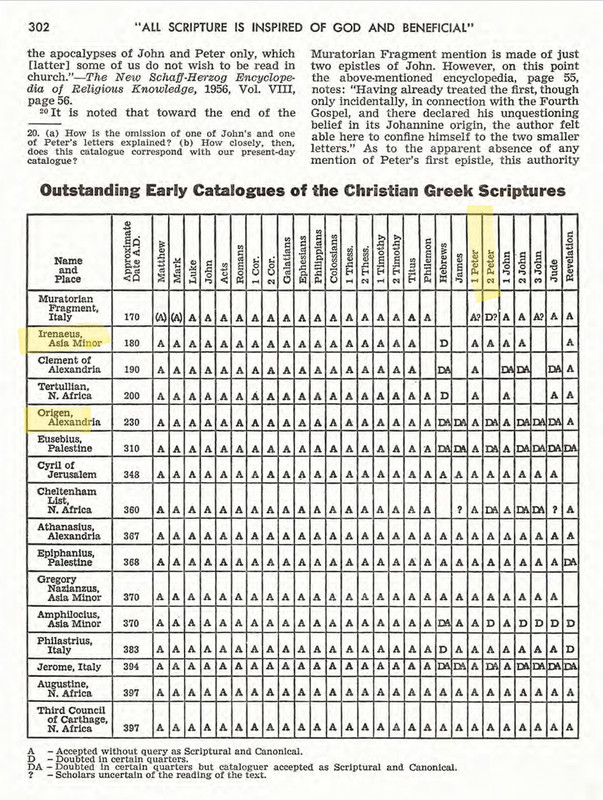[
Replying to historia in post #2]
I can see that your ideas about the "canon" of the NT is subordinate to the Orthodox Church and its decisions around the 5th century.
I'll tell you my point of view:
1) "Canon" is the collection of inspired Scriptures. That makes every single inspired book a part of it, and it means: each inspired book is a canonical book. The qualification as a "canonical book" does not depend on the decision of some person; it depends solely and exclusively on the determination under divine criteria that such a book was really inspired by the holy spirit. That means that ONLY AND EXCLUSIVELY by holy spirit can it be determined what that same holy spirit inspired to be collected in a writing to be used as "
a measuring rule or standard for determining right faith and doctrine and what is acceptable conduct with God".
2) Notice: since the Orthodox Church did not exist when the inspired books were written and adopted as such, that institution has nothing to do with the "canon" in this sense. The "canon" (and I will exclusively call that what I refer to before) was COMPLETED when the last inspired book was written and began to be read, consulted, used for the strengthening of the teaching received from Jesus, the apostles and the anointed ones at Pentecost (who continued the work after Jesus' death and did not continue to live long after the death of the Apostle John in the late first century).
3) There were no other canonical books after Revelation. That inspired book was written in the late 1st century. By that time existing congregations already had collections of Paul's letters, gospels, and other inspired books that they consulted to learn the original truths taught and recorded (in different styles of writing and types of documents) for nearly 30 years earlier, before the last writings of John.
4) Christian congregations were organized into a "global" congregation. All of them had been supervised by a Governing Body based in Jerusalem and made up of some elders and apostles, as can be verified in the account of Acts 15 and 16. That direction prevented the congregations from considering as "coming from God" any religious writing or "speech" that did not agree with the truths already recorded and taught around the world. Changes were supervised ... and that process stopped only until shortly after the death of the apostle John, who was apparently the last remaining anointed of those authentically recognized as such.
5) Apart from the easy determination of a false teaching during the life of the apostles and first anointed ones, there was a way to determine if a writing or speech was really inspired by God by his spirit. Only a few Christians had been chosen by God to write a book that would result in part of the inspired volume of the NT:
a) two half-brothers of Jesus: James and Jude;
b) three apostles out of the 12: Mateo, Pedro and Juan;
c) two special collaborators who were also Jewish converts to Christianity shortly after Jesus' death: Mark and Luke;
d) Paul, as a special apostle.
As can be seen there is a pattern: all of them were either close to Jesus or joined Christianity shortly after Jesus' death, like Mark and Luke. We also know that Jesus' brothers were unbelievers until his death, but that after the resurrection James became a column of the world congregation and Jude wrote a small letter to Christians. And of Paul we know that he had the vision and conversion of him shortly after 33. There was ABSOLUTELY no other Christian selected by God to record any other inspired book. That "gift" of the holy spirit did not spread to others. However, there was another gift of the holy spirit that contributed to the identification of what was inspired and what was not.
The Orthodox Church, which emerged many years later, never had a part in this process, nor was it the administrator of the gifts of the holy spirit, nor was the institution that emerged shortly after John's death.
1 Cor. 12:4 Now there are varieties of gifts, but there is the same spirit; 5 and there are varieties of ministries, and yet there is the same Lord; 6 and there are varieties of operations, and yet it is the same God who performs all the operations in all persons. 7 But the manifestation of the spirit is given to each one for a beneficial purpose. 8 For example, to one there is given through the spirit speech of wisdom, to another speech of knowledge according to the same spirit, 9 to another faith by the same spirit, to another gifts of healings by that one spirit, 10 to yet another operations of powerful works, to another prophesying, to another
discernment of inspired utterances, to another different tongues, and to another interpretation of tongues. 11 But all these operations the one and the same spirit performs, making a distribution to each one respectively just as it wills.
That is the reason why it was IMPOSSIBLE for there to be other inspired writers after the apostasy: the spirit of God no longer bestowed these gifts, as had happened at Pentecost.
As you can see, my point of view is based on biblical facts ... while yours is based on your loyalty to the institution of which you are a part.





